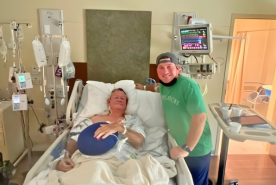July 08, 2022
Need a kidney transplant but don't know where to start? Here's advice from two transplant recipients who've been in your shoes.
Finding a living donor can sound scary and overwhelming. Where do you start and what are the best ways to share your story? Here’s advice from two transplant recipients who once stood in your shoes and a transplant social worker: Gisela Delgado, an advocate for living donation; Morgan Reid, Transplant Policy and Strategy with the National Kidney Foundation; and Dori Mench, a post-transplant social worker.
Where to Start
Whether you are diagnosed with an earlier stage of kidney disease or kidney failure, it is important to learn everything you can about the kidneys, how to maintain function, and what treatments, like transplants, are available.
Next, get evaluated for a transplant by a transplant center to ensure you are a good fit for the procedure. Potential living donors are typically allowed to get evaluated once you are going through the evaluation or are already on the waitlist, so ask your doctor for a referral or call transplant centers directly to begin the evaluation process.
Your care team will:
- Review your medical and surgical history
- Do a physical and social history exam
- Do lab work to see how compatible you might be with a donor kidney
Whether or not you have or are looking for a living donor, the first step is to get evaluated and approved for the transplant waiting list.
Subscribe today!
Join the NKF Blog Newsletter
Get inspirational stories and kidney disease resources delivered to your inbox every month. You'll gain practical insights and expert advice to help you better understand and manage your kidney health no matter where you are on your kidney journey.
Opening Up
Now here comes the part that many people needing a transplant find difficult– sharing their stories.
When Giselle Delgado learned that she needed a transplant, she felt alone and disliked the idea of asking for help. "I need this thing, and it's not something I could just go and get by myself. I'm going to need help. I'm not the type of person that generally asks for help; I help other people."
Morgan Reid agreed: "Thinking about finding someone to donate a kidney to me outside of my family was difficult to consider. I just couldn't wrap my head around how I could ever pay someone back for saving my life"
So how did Giselle and Morgan overcome these feelings and share their stories?
They remembered:
- Sharing doesn't necessarily mean asking for someone to donate a kidney. You can invite others to spread your story; someone may hear it and make the selfless decision to donate.
- Many friends and family want to help, so let them know how they can—sharing your story, cooking a kidney-friendly meal when you visit, pick-up medications, or just talking with you.
- No one is forced to donate their kidney. The donor chooses to go through this process because they want to.
- Transplant centers value the health of potential donors just as much as the recipient. Potential kidney donors are carefully evaluated to make sure they are physically and mentally able to donate.
- Research has shown that donating a kidney only has a small risk of complications for the donor. Additionally, they will have an entire care team dedicated to their recovery.
"It's really important for everybody to understand that we'll never put a living donor in any harm's way to benefit a recipient.” Dori Mench said, “If they're not a candidate, they get to share their experience with other people. It’s not just for you, but for anybody else who might need a living donor transplant at any time."
Are you thinking about donating your kidney? We applaud you! Get started by learning about the living donor process.
How to Share Your Story to Find a Kidney Donor
Plan: Identity potential donors, like family or friends, and places to share your story. For example, social media, work, school, places of worship, community centers, and gyms are great for spreading information.
Be vulnerable: When sharing your story, try to be as open as possible. Give those learning about you an insight into your character, show the people who love you, and be honest about your difficulties. Be sure to also provide the transplant center or nurse coordinator’s phone number, not your personal one, and encourage potential donors to call if they want to learn more.
In Giselle’s case, she found that even though friends and family knew about the illness, they didn't realize just how sick she was.
"I felt pretty terrible, so I kicked up the vulnerability and started sharing more about what it felt like to have kidney disease," she said, "My brother knew that I was sick but didn't realize the severity. He got tested but didn't say anything. Two weeks later, we were in surgery."
If you’re struggling to open up, use this sample letter or social media post to get you started.
Educate: Most people aren't familiar with kidney transplantation and donation so teach them about it!
Here are five things you can share:
- You only need one healthy kidney to live a healthy life.
- A kidney from a living donor lasts about 15 to 20 years.
- A kidney from a living donor usually functions immediately because the kidney is out of the body for a short time which isn't always the case for deceased donor kidneys.
- A donor's blood type and compatibility don't matter because there are exchange programs available to help with matching incompatible pairs.
- Curious people can visit reliable websites, like the National Kidney Foundation and your transplant center, for unbiased information and next steps.
Here are some more resources you can share.
You can also contact our Patient Information Help Line, NKF Cares, toll-free at 855.653.2273 or email nkfcares@kidney.org to request free educational brochures to share with your friends or family members.


















